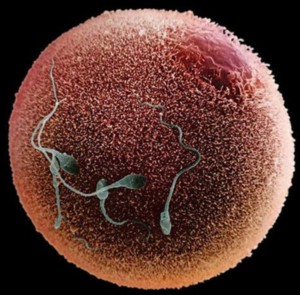Viruses
Viruses have been around since life began but they are 'of life', they are not technically 'alive' because they cannot themselves reproduce. They are extremely small - about 70 microns in diametre - and until the invention of electron microscopes in the 1930's their existance had only been inferred.
To create copies of themselves they need a host cell with the necessary reproductive mechanisms. Over the millennia viruses have evolved the necessary mechanisms to penetrate cells, much like spermatozoa, and inject their DNA or RNA and capture the host's replication mechanisms so that the infected cell begins manufacturing thousands of virion (virus particle) clones of the invader. These then capture other nearby cells in the host animal or plant; or in similar bacteria. Huge numbers of infected cells are usually destroyed in the process, sometimes killing the plant or animal.

Coronavirus particles (yellow) on the surface of a dying cell (that produced them)
Niaid/National Institutes of Health/Science Photo Library (from https://www.newscientist.com)
But animals plants and bacteria have become familiar with this threat and have in turn evolved means of dealing with or living with viruses to the extent that some are exploited for the benefit of the host.
In turn viruses evolve new strategies to perpetuate their reproduction. Thus new viruses arise from time to time, sometimes jumping from one species to another when an opportunity arises.
Many animals, including humans, have an immune system that has a memory of harmful viruses and means of neutralising them. Thus, once the animal has been infected and survived, the chances of reinfection are reduced. Vaccines work by presenting our immune system with a harmless sample that allows it to recognise a particular harmful virus.
Since I first wrote this article the World has suffered a new viral pandemic. It is a novel corona virus for which we have no established immunity and there is no vaccine. At the end of June 2020 the Covi-19 virus has already killed half a million people.
It is estimated that this virus will no longer find sufficient vulnerable hosts to spread further after infecting around 70% of the populations in which it is spreading. It has a case fatality rate of just under 1%, that is, of those who catch it just under one in a hundred die.
Quarantine restrictions are in place in many countries to protect relatively uninfected areas, with local measures to eliminate 'hot spots'. But the majority of the world's population, in excess of five billion, are in countries in which it is presently spreading.
Unless a vaccine is available soon it seems inevitable that many millions more will be killed. The economic consequences are also dire.

